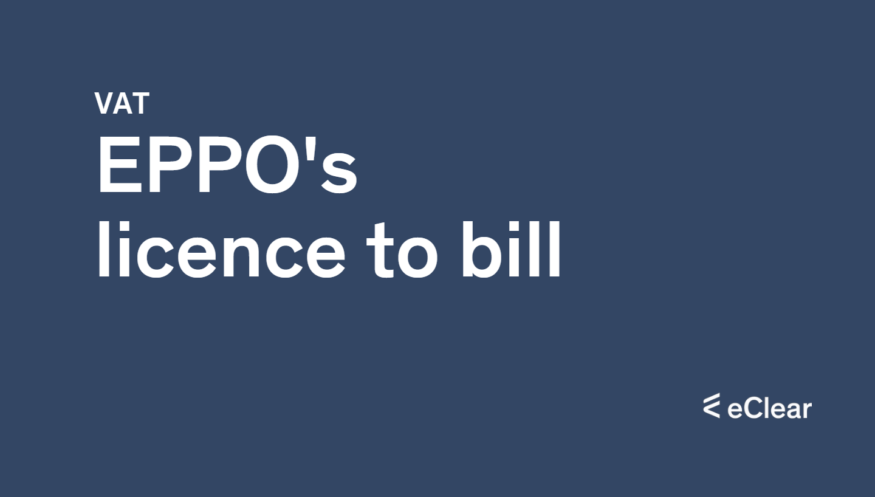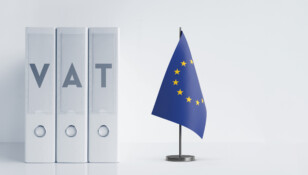Unfortunately, the European Union had to painfully realise that open borders not only promised good things during its expansion, but soon had to react to pressing problems such as human trafficking. Whereas a few years ago, it was still said in investigations that the jurisdiction of national public prosecutors’ offices ended at the borders of their territory, political Brussels soon agreed on a solution and vowed to do better. A basis for a common European Public Prosecutor’s Office was needed. After challenging and years-long negotiations, it was agreed to establish this supranational authority.
On behalf of Europe: Laura C. Kövesi, Attorney General EPPO
“Europe’s top corruption hunter has many opponents”, the Neue Zürcher Zeitung once headlined when Laura Codruta Kövesi, Attorney General of the EPPO, took up her work in the newly created authority. It was nothing new for Kövesi to incur the wrath of many influential people. Even when she took up law studies as a young woman in Romania, she was advised against it. “That’s only for men,” they said at the time. No one could have guessed then that Kövesi would soon become an anti-corruption icon in Romania: appointed Romania’s youngest attorney general in 2006, her path led her after a few years to the highly respected anti-corruption agency DNA (Direcției Naționale Anticorupție), from where she stung wasps’ nests and busted high-ranking politicians in the country. The list of those convicted reads like something out of a lousy mafia epic – headed by former prime minister Victor Ponta. Kövesi can also chalk up the resignation of the now-imprisoned ex-leader of the Social Democrats, Liviu Dragnea, as her success.

Even if the “cleaner in the shark tank” had to bring out the big guns during her time at the DNA, her record is impressive: In 2015, her anti-corruption agency DNA indicted those mentioned above former prime minister, five cabinet members and another 21 parliamentarians. Also convicted were legions of businesspeople and mayors, but also police officers and public prosecutors. Between 2015 and 2016, the DNA brought 1270 people to court for fraud, accepting bribes, money laundering, favouritism, tax evasion and abuse of office. Since 2013, the agency has been headed by Laura Kövesi, one of the most influential women in Romania at the time by virtue of her office. Nevertheless, 60% of Romanians trust DNA.
A reputation that Romania’s government could only dream of. Only 11% of the population trusted the elected parliamentarians. At most, the Romanian Orthodox Church can compete with the DNA, at least in the “trust index”. No task was too delicate for Kövesi until Romania’s post-communists took their revenge: For their part, they slapped the corruption hunter with charges of abuse of office and bribery and put her out on the street in 2018. But Kövesi did not let herself be beaten down; the former basketball player soon applied for the post of attorney general for the EPPO and then had to endure the fiercest opposition even from within her ranks; she had clashed too much with the powerful in her home country. But this was precisely one of the decisive criteria for the EU to choose the high-flyer from Romania because the indomitable lawyer actively tackled Romania’s separation of powers, which was getting out of hand.
However, let’s take a closer look at the EPPO. What is its history of development? What did it stand for, and what is its track record so far?
The European Public Prosecutor’s Office
The European Public Prosecutor’s Office (EPPO) is a new European institution that officially started its work in November 2020, operational in July 2021, to strengthen the rule of law in Europe and ensure the protection of the European Union’s financial interests.
The history of the EPPO dates to 2013, when the European Commission presented a proposal for a European Public Prosecutor’s Office. The Member States finally approved this proposal in June 2017, and the procedure to establish the EPPO was completed in April 2019.
The EPPO is an independent and impartial institution responsible for protecting the “financial interests of the European Union”. It investigates crimes such as fraud, corruption, and money laundering and brings charges against the perpetrators where appropriate.
Combating cross-border crime and law enforcement
The focus of the EPPO is on the protection of European taxpayers, especially in the fight against cross-border crime. This includes offences related to the European Development and Social Funds. This includes violations related to the European Regional Development Fund and the European Social Fund.
Another critical area in which the EPPO is active is assisting Member States in implementing European legislation. To ensure this, cooperation with other European law enforcement agencies and the transfer of information is of utmost importance. After all, in the first four months after the start of operations, the balance sheet was respectable: 350 fraud cases, whose total damage was estimated at 4.6 billion euros, are a good start and once again confirm the necessity of the EPPO.
The EPPO works closely with other European law enforcement agencies to operate more effectively and efficiently and to ensure resounding success in the fight against crime. This includes cooperation with the European Investigation Office (Eurojust) and the European Monitoring Bureau for Drugs and Drug Trafficking (EMCDDA).
Effective fight against financial crime
Overall, the European Public Prosecutor’s Office is an essential step towards closer cooperation between European states in combating crimes that jeopardise the finances of the European Union. Through its independence and competence, the EPPO will help prosecute crimes more quickly and efficiently and strengthen the rule of law in Europe.
The EPPO is also a key player in the European criminal justice system and will play a significant role in combating crimes that threaten European finances and the rule of law. Its close cooperation with other European law enforcement agencies and its ability to effectively collect and share information and evidence will help ensure that crimes can be prosecuted more quickly and effectively.
In the future, the EPPO will play an important role in combating crimes related to the finances of the European Union and protecting the rule of law in Europe. It will be a significant pillar of European justice and an important player in the European criminal justice system.
Criticism from Poland, Hungary, and other EU countries
Of course, before a new authority is created, there is a need for discussion – 27 member states also mean 27 different opinions. And not every EU member state is open to the EPPO; some may have their legal views and fear that national sovereignty will suffer too much and be transferred to Luxembourg.
The European Public Prosecutor’s Office relies on the help of 88 delegated prosecutors in the field for its investigations, who, however, remain part of their national judiciary. The role of these prosecutors is central to the authority’s work, as they investigate on behalf of the European Public Prosecutor’s Office and are bound by instructions to the EPPO. However, whether their investigations lead to arrests is up to the national authorities.
However, some critics see the role of delegated prosecutors as a weakness of the authority. There is a danger that government prosecutors will not comply with EPPO’s charges and let investigations go nowhere. Poland and Hungary, already considered the most significant rule of law offenders to the greatest degree in the EU, do not even participate in the European Public Prosecutor’s Office. Ireland, Denmark, and Sweden are not represented either, with the latter rejecting greater integration in the judiciary primarily because of constitutional reservations.
But Bulgaria should also be mentioned here in this context: the EPPO had massive staffing problems in February 2023, especially in the capital Sofia. Some EU-deputised prosecutors working on VAT and money fraud cases in Bulgaria have left the office, EURACTIV reports. Two of the nine Bulgarian prosecutors seconded by the EU have already resigned. They are returning to the Bulgarian judicial system, while a third prosecutor is currently applying for a job at Eurojust. To what extent can the EPPO conduct serious investigations in Bulgaria with such concerns arising?
In a comment to EURACTIV, Kövesi’s office placatingly stated that “the resignations are of a personal nature, so EPPO as an organisation cannot comment on this.” The EPPO added that it is “looking into the matter closely.”
Six EU member states do not participate in the European Public Prosecutor’s Office
- Denmark has negotiated an opt-out clause for judicial cooperation and criminal law within the EU, and therefore does not participate in the EPPO.
- Ireland has also negotiated an opt-out clause for judicial cooperation and criminal law within the EU, and therefore does not participate in the EPPO. In addition, criticism has been that it sees the EPPO as placing an unnecessary burden on national judicial systems and could disrupt domestic investigations.
- Although Sweden has not negotiated the opt-out clause for judicial cooperation and criminal law, it has decided not to participate in the EPPO. Sweden is also concerned that the EPPO may need to be more effective and may burden the member states’ judicial systems excessively. Sweden further cites concerns that the EPPO could interfere with national investigations and possibly lead to double jeopardy.
- Although Poland has decided to participate in the EPPO, it has taken legal action to challenge the establishment of the EPPO and its jurisdiction. Accordingly, Poland has opposed the EPPO because it believes that the institution violates national sovereignty and the principle of subsidiarity. Poland also fears that the EPPO may be politically motivated and that Polish citizens may be mistreated.
- Hungary has also chosen to participate in the EPPO. Still, it has expressed concerns about the independence of the EPPO and its impact on national sovereignty. Hungary, like Poland, has raised concerns, claiming that the EPPO is pursuing a political agenda and violating member states’ rights. Hungary also sees a possible threat to national sovereignty and fears that the EPPO could be used by its political opponents.
- Although the United Kingdom was a member state of the EU, it withdrew from the EU due to the Brexit process and did not participate in the EPPO.
The opt-out clause and its application
The opt-out clause is a mechanism that allows Member States of the European Union to opt-out or opts out of specific EU policies or initiatives if they interfere with their national interests or constitution. Quasi-derogation from specific EU policies or instruments allows the member states that use them some flexibility and control over their affairs.
In the specific case of the EPPO, Denmark and Ireland have exercised their opt-out right to exclude themselves from judicial and law enforcement cooperation within the EU. This means these countries do not participate in the EPPO and have no obligation to implement the decisions or procedures issued by the EPPO on their territory. Other countries, such as Sweden, have yet to exclude themselves officially but have agreed not to participate in the EPPO.
Current investigations by the EPPO
In the short time of its existence, EPPO has achieved considerable success and spared European taxpayers from massive financial losses.
That Kövesi takes her task seriously is shown by her current investigations, in which the investigators are targeting even EU Council President Ursula von der Leyen:
European Public Prosecutor’s Office investigates vaccine procurement
Since October 2022, the European Public Prosecutor’s Office, led by Chief Kövesi, has been investigating unknown persons for irregularities in procuring Covid-19 vaccines in the European Union. In a terse statement, the authority confirmed the ongoing investigation due to high public interest, without giving further details.
The investigations are causing great nervousness in the upper echelons of the EU Commission, reports the usually very well-informed magazine Politico. This is because the contract negotiations with the vaccine manufacturers were a “matter for the bosses”. The president of the EU Commission, Ursula von der Leyen, had taken the deal into her hands with Pfizer boss Albert Bourla. The volume is said to have been about 35 billion euros, according to MDR.
The European Public Prosecutor’s Office is not the first authority to investigate possible irregularities in the procurement of vaccines. A year ago, the EU Ombudsman Emily O’Reilly had already wanted to know what was in the contracts with the pharmaceutical companies. Unfortunately, von der Leyen could not find the text messages she had exchanged with Bourla. The angry Ombudsman was told that text messages with “irrelevant content” were not archived.
The investigations by the European Public Prosecutor’s Office now shed light on possible irregularities in procuring the coveted vaccines and could have political consequences. However, the investigations are still early, and further details are unknown.
It remains to be seen what the investigations will bring to light; the terse reply to the Ombudsman leaves quite reasonable doubt. When EU Council President von der Leyen declares her communication on this matter to be “irrelevant content”, one cannot help but think that the EPPO’s investigations are perhaps being deliberately thwarted…
Quo vadis, EPPO? Impressive achievements with massive potential
On 01/03/2023, the annual report of EPPO was published, introduced by the foreword of Attorney General Kövesi:
“A year and a half into our operations, EPPO’s potential cannot be overlooked. In 2022, we proved that the EPPO could identify and trace volatile financial flows and opaque legal arrangements. We have proven that the speed, efficiency, and information gain of EPPO-led investigations make it difficult for traditional cross-border coordination methods to compete.
We are on the right track, but we need to do more. EPPO has yet to reach its full potential. If we want EPPO to make a lasting difference, we must make organisational and legal adjustments. This includes revising the EPPO Regulation and assigning specialised investigators in all participating Member States to handle EPPO financial fraud cases.”
Moreover, the figures in the graph below impressively demonstrate why the work of the EPPO is imperative and why establishing this authority on behalf of all Europeans was and will be even more important in the future.
It remains to be seen how the EPPO will develop in the future. Either way, one thing is proven: The work of this new European institution is in the interest of all Europeans and clearly shows that cross-border VAT fraud must finally be stopped in the interest of all.








